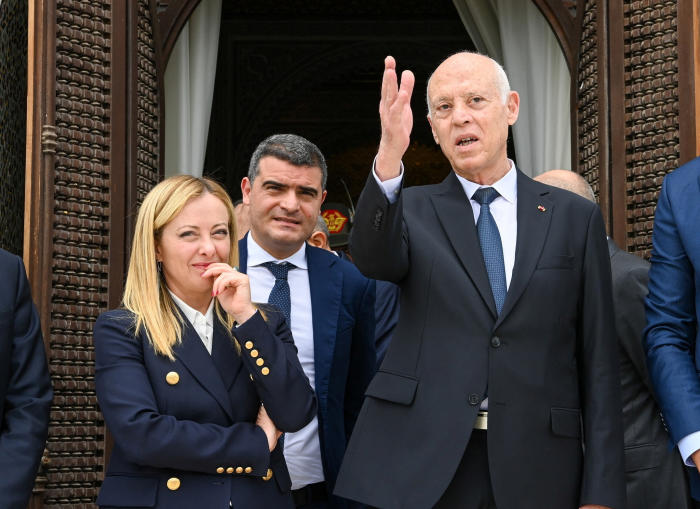In Bukavu, a woman protests in the streets against the authorities; the police shoot and…

The Mattei Plan: Italy as an Energy Hub in the Mediterranean
The Italian government, under the leadership of Prime Minister Giorgia Meloni, has introduced the much-debated Piano lo Mattei, an ambitious strategic project aiming to transform Italy into a crucial energy hub in the Mediterranean. Inspired by Enrico Mattei, the founder of Eni, the strategy seeks to eliminate the dependence on Russian gas and counter Islamist radicalism while promoting collaboration with African nations.
The plan proposes close cooperation in the oil market, aiming to establish more direct relationships between producing and consuming countries. This approach, inspired by Mattei’s schemes in the ’60s, represents a significant shift from the model dominated by major oil companies.
The initiative began with the first institutional trip to Algeria, followed by crucial stops in Libya and Ethiopia. These visits underscore the Italian government’s attention to Africa, seeking to strengthen economic and social collaboration with the continent. The goal is to promote sustainable and lasting development in the hope of mitigating the root causes of irregular migrations.
Despite ambitious goals, the Mattei Plan has sparked debates and controversies. However, the Meloni government has emphasized that the plan is a virtuous model of collaboration between the European Union and African nations, expecting that this collaboration will not only strengthen economic ties but also contribute to countering the growing Islamist radicalism, especially in the sub-Saharan area. This will be achieved through focused initiatives such as socio-economic development, promotion of education and training, security collaboration, promotion of religious tolerance, and other common initiatives aimed at addressing the root causes of irregular migrations through cooperation with international organizations, creating a more stable and positively alternative context to radicalism. The challenge lies in implementing these initiatives with cultural sensitivity and inclusive participation.
The Mattei Plan is therefore a significant step for Italy in the geopolitical and energy context. The ambition to become an energy hub in the Mediterranean is an ambitious challenge, but the Meloni government is determined to turn this vision into reality. It remains to be seen how the plan will evolve over time and what its actual impacts will be on energy policy, international relations, and sustainable economic development.
Considerations from an African Perspective
The initiative to intensify collaboration between Italy and African countries has been met with a mix of enthusiasm and caution. While the Mattei Plan offers opportunities for economic and social development for African states, there are concerns about power dynamics and possible implications for national sovereignty.
Particularly, states involved in the initial institutional trips, such as Algeria, Libya, and Ethiopia, are carefully examining Italian proposals. There is a palpable interest for closer economic cooperation, but at the same time, there is a fear of becoming mere suppliers of raw materials without concrete benefits for the population and reproducing past colonial patterns.
In summary, the success of the Mattei Plan is not only about energy but also about the ability to build balanced and sustainable relationships with African countries. The commitment is to pursue objectives with respect for sovereignty and the interests of partner nations, identifying common challenges collaboratively and inclusively.
The Mattei Plan: Italy as an Energy Hub in the Mediterranean – Pros and Cons for African Nations
Like all projects involving various stakeholders, the Mattei Plan comes with a series of potential benefits and issues to address for the African countries involved.
Possible Advantages for African Nations
- Economic Development: Economic collaboration proposed by the Mattei Plan offers opportunities for investment and infrastructure development in involved African countries, stimulating economic growth and job creation.
- Diversification in the Economy: Through cooperation in the energy sector, African nations could benefit from diversifying their economies, reducing dependence on traditional and vulnerable sectors.
- Prevention of Irregular Migrations: By addressing the root causes of irregular migrations and proposing joint initiatives to improve socio-economic conditions in African countries, reducing motivations for migratory pressure.
- Counter Radical Islamism: Collaboration could contribute to strengthening stability and security in the region, promoting greater cooperation among countries to address common challenges. A crucial goal will be to avoid the Mattei Plan being exploited by subversive elements as an attempt to interfere in the delicate internal affairs of these nations.
Possible Challenges for African Nations:
- Economic Dependency: There is a risk that African nations become heavily dependent on Italy in the energy sector, potentially creating a situation of economic imbalance and political influence.
- Environmental Risks: The expansion of activities in the energy sector could pose environmental risks, with potential negative impacts on land, water, and biodiversity in the involved nations.
- Social Inequalities: If not managed carefully, economic development could lead to social inequalities within African nations, with the risk that only certain segments of the population benefit from economic expansion.
- Possible Political Instrumentalization: Some critics fear that the Mattei Plan could be used for political purposes, influencing internal balances in African nations in ways that may not always be to their advantage.
- Lack of Popular Involvement: It is essential to ensure that decisions related to the implementation of the plan are made transparently and actively involve the population, avoiding potential tensions and discontent.
Additionally, the international community is closely monitoring this initiative. Many countries, as well as international organizations and NGOs, are calling for transparency and inclusivity in the decision-making process, ensuring that the interests of African nations are adequately represented.



